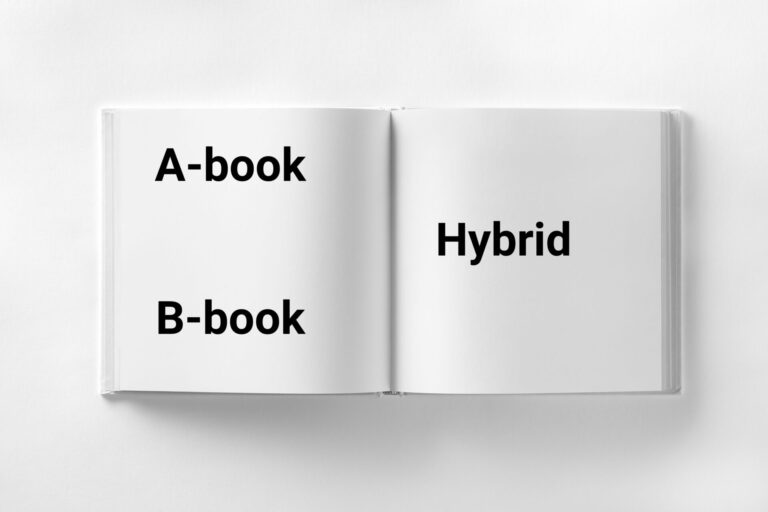
Forex trading differs significantly from trading stocks or futures. Unlike those markets, there is no centralized forex market, and all trades are cleared within a broker. Yes, you read that correctly: in the retail Forex market, despite what brokers may claim, all orders technically stay within the broker.
Consequently, the Forex market is much less transparent than the futures market. This, in itself, is neither inherently good nor bad from a trader’s perspective. It doesn’t automatically imply that your forex broker is out to deceive you every time you place a trade. However, we’re not saying that such incidents can’t or don’t happen either.
This article will review and classify forex brokers by how they process clients’ trades, including A-booking, B-booking, and combinations of both.
What Exactly Is a “Book” in the World of Trading?
When you hear the term “book” in retail forex trading or any other kind of trading, it’s essentially about keeping a detailed record. Think of it as a diary or ledger where a trading entity like a brokerage or dealer logs every single trade and order. This includes all the crucial details: where positions are held, their prices, how much is being traded, and how long each trade is kept open. It’s like the comprehensive summary of everything a trading desk or a trader is handling at any moment.
In the world of retail forex trading, you’ll often come across the terms A-book and B-book. These are just fancy ways brokers categorize how they handle and execute trades.
Brokers might use a mix of both methods based on what kind of trader you are, market conditions, or how they prefer to manage risk. Understanding these methods can give you insight into your broker’s operations and possibly their motivations.
A-Booking vs. B-Booking
When you buy or sell a currency, your broker* either sells it to you from their “inventory” or buys it from you. If your broker keeps all your trades “in-house,” this is referred to as “market making” or B-booking in professional terms.
In this setup, your losses become your broker’s gains, and your gains become their losses. Unfortunately, statistics show that approximately 70-90% of retail traders lose their accounts within the first six months. This creates a strong incentive for brokers to B-book their clients, as most traders end up losing anyway, reducing the broker’s risk.
On the opposite end, there are the rare entities known as A-book brokers. These brokers supposedly send all your trades to the real interbank market and charge a small fee for this service. However, they are as elusive as unicorns and rarely encountered in the wild.
*Technically, all retail forex brokers are dealers. They often refer to themselves as brokers primarily for marketing reasons—”broker” simply sounds cooler.
Let us take a closer look at the mechanics of B-booking.
As mentioned earlier, 70-90% of traders ‘blow’ their accounts within six months. In light of this, B-booking appears to be a much more attractive business model compared to A-booking. Let’s illustrate this with an example.
Comparison
Let us make a side-to-side comparison of both types of brokers. For demonstrational purposes here, we are going to make several simplifying assumptions:
- Both brokers have ten clients
- All these clients deposit USD 1000
- Every single one makes ten trades (round-trip), one standard lot each, within six months
- We will not include the spread or the fees that A-book brokers have to pay to their LPs (Liquidity Providers) in the following calculations
So, what do we have now?
The only source of profit for our A-book broker is the commission they charge on each trade their clients make. Suppose a hypothetical B-book broker charges USD 7 for the round trip (USD 3.5 for each side of the round-turn lot). Both brokers started with USD 10,000 of the client’s money. Each of their ten clients made a USD 1,000 deposit, resulting in 100 one-lot trades at the end of six months.
Therefore, our A-book broker would make a profit of USD 700 (100 lots traded times USD 7). However, in reality, they need to pay fees to their liquidity providers (LPs), which would reduce their actual profit per lot traded. With that in mind, it’s important to consider the economic feasibility of running a pure A-book brokerage.
By comparison, the B-book broker would perform differently under the same assumptions. We stated that 70-90% of traders lose their deposits within six months. If 90% of clients lost their accounts, our B-book broker would earn USD 9,000.
The B-book model can potentially create a conflict of interest, where your loss would be in the broker’s best interest. It is crucial to note that not all B-book brokers engage in dishonest practices. While some brokers may use unfair tactics to make clients lose money, many are excellent and honest, prioritizing their reputation and the well-being of their clients. To ensure transparency and reliability, consider researching brokers on review pages and checking out comments on platforms like Forex Peace Army (FPA).
What is the Hybrid Model?
But what if we told you that the B-booking model could be enhanced even further? Remember when we said that market makers sustain losses whenever traders make profits and vice versa? Well, some brokers have devised a hybrid model that aims to balance this risk. In this model, a small percentage of profitable traders can be filtered out, and their trades can be transmitted to the inter-market, shifting their risk to the broker’s liquidity provider (LP) and others further down the chain. The broker still profits by charging these traders the ECN commission for facilitating their trades.
This hybrid broker model combines both A-booking and B-booking practices. They may keep all their clients’ losses (broker’s gain) or absorb their gains (broker’s loss) and charge profitable traders a commission for providing access to the inter-market. It is worth noting that in the modern forex industry, many brokers operate as hybrids, regardless of how they market themselves. While some brokers may offer high leverage (anything higher than 1:100), it doesn’t necessarily determine their broker type; some high-leverage brokers can still adhere to ethical and transparent practices.
How Do Forex Brokers Decide What to Do With Their Profitable Clients?
As a part of their ongoing risk management process, all brokers, no matter the type, monitor their clients and analyze their trading patterns. We mentioned before that most traders would blow their accounts independently without being affected by any exogenous factors.
So, if a client can consistently beat the market on a long-term basis, this would naturally draw the broker’s attention and pick their interest. As a result, the broker would try to understand why this client is profitable. Is this client abusing the system somehow? Are there problems with the price feed etc.? Once the broker makes sure that there is no trickery afoot, they make a strategic decision to keep the client on their B-book and assume the risk or to transfer that client to A-book, thus reducing their risk and their hypothetical profits. Tough choice, lol.
If that client gets transferred to A-book, their orders will be redirected to the broker’s LP (Liquidity Provider) for execution, and the broker will charge only a fee for doing so.
Conclusion
Above, we reviewed three different breeds of forex brokers. In conclusion, out of the three broker types we reviewed, the B-book broker and the hybrid are the most profitable models from the broker’s perspective. And these are the models that retail forex brokers decide to use when they start their companies (check out our previous articles on creating your broker: articles one, two, and three).
If you are a retail trader, you probably think those guys are profitable, so they must be the worst ones, and I should be looking for an A-book broker. The thing is that neither of them is inherently good or bad. What can make them good or bad are the people running them.
Indeed, B-booking in forex creates a powerful incentive for a broker to do all sorts of stuff to “help” traders along to lose their accounts quicker. Nobody denies that. And admittedly, back in the day, many unscrupulous forex brokers gave a bad name to the whole industry. And nowadays, people automatically assume that their broker is always trying to rig the game somehow.
We said that brokers could market themselves as pure ECN/STP or whatever, but they are most likely a B-book or a hybrid broker. Therefore, the best advice we can give you is that no matter which broker you end up trading with, you have to be comfortable with them. Please do your due diligence, don’t rush into things, and test them for a month or two (or even longer). See how knowledgeable their support staff are and how hard/easy they are to get a hold of. Read their reviews on websites like FPA.
Take your time and do your thorough research when making investment decisions. To save time and effort for our valued followers and clients, we’ve hand selected



